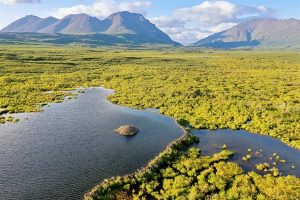2021 Arctic Report Card Released
Climate change transforming Arctic into ‘dramatically different state’
 On December 14, the 2021 Arctic Report Card was released at a virtual press conference hosted by the American Geophysical Union (AGU) as part of its Fall Meeting. Now in its sixteenth year, the Arctic Report Card continues to show how rapid and pronounced warming continues to drive the evolution of the Arctic environment. This report catalogs the numerous ways that climate change continues to disrupt the polar north, with this year ranking as the seventh warmest on record, in addition to a continuing trend of loss of snow, diminishing winter ice cover, and drastic melt events on Greenland.
On December 14, the 2021 Arctic Report Card was released at a virtual press conference hosted by the American Geophysical Union (AGU) as part of its Fall Meeting. Now in its sixteenth year, the Arctic Report Card continues to show how rapid and pronounced warming continues to drive the evolution of the Arctic environment. This report catalogs the numerous ways that climate change continues to disrupt the polar north, with this year ranking as the seventh warmest on record, in addition to a continuing trend of loss of snow, diminishing winter ice cover, and drastic melt events on Greenland.
“The Arctic Report Card continues to show how the impacts of human-caused climate change are propelling the Arctic region into a dramatically different state than it was in just a few decades ago,” said NOAA Administrator Rick Spinrad, Ph.D. “The trends are alarming and undeniable. We face a decisive moment. We must take action to confront the climate crisis.”
Spinrad provided opening remarks to the press conference, and authors Lawrence Mudryk, Gabe Wolken, Kaare Sikuaq Erickson, and lead editor Twila Moon presented key findings. The press conference generated strong coverage, with articles up within hours of the release on the Washington Post, Associated Press, Reuters, CNN, and Los Angeles Times, among others.
The Arctic Report Card is an annual report of original, peer-reviewed environmental observations and analyses of a region undergoing rapid and dramatic alterations to weather, climate, and oceanic, and land conditions. Compiled by 111 scientists from 12 nations, the 2021 Report Card tracks environmental indicators to inform decisions by local, state, and federal leaders confronting a rapidly changing climate and ecosystems. This year’s Report also highlights how COVID-19 has impacted food access for Alaska Natives.
Learn more about the 2021 Arctic Report Card:
Read highlights in the NOAA press release
Watch the video summarizing the report’s findings
See image and graphic highlights from Climate.gov
Download the full report
Watch the recorded press conference video
The Arctic Report Card is funded and coordinated by the Global Ocean Monitoring and Observing (GOMO) Program, Arctic Research Program. The website and video production are managed by the Pacific Marine Environmental Laboratory, graphics and web stories are created by the Climate Program Office (CPO) through climate.gov, and NOAA Communications coordinates the rollout and press for the Report Card. Ben DeAngelo (CPO) serves as the NOAA Federal Advisor and Kelley Uhlig (GOMO) serves as the Coordinating Editor.